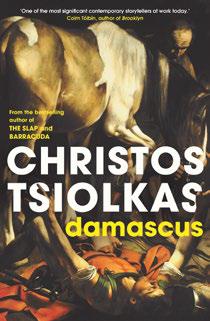 Damascus
Damascus
CHRISTOS TSIOLKAS
ALLEN AND UNWIN, 2019
I was compelled to read Damascus after hearing its well-known Australian author, Christos Tsiolkas, speak at the Perth Writer’s Festival. Only knowing Tsiolkas as the author of the controversial, bad-language-peppered novel The Slap, I was bracing myself for the session to be an atheistic, disdainful, mocking critique of biblical Christianity; at best annoying, at worst blasphemous. How wrong I was.
Tsiolkas spoke with warm humility about his persistent, genuine fascination with Christianity that he has had throughout his life. Having been raised Greek Orthodox, in his teenage years he was invited by an evangelical friend to study the Bible. He was drawn to the love and graciousness of Jesus, and Christ’s care for the outcast.
However, his growing awareness of his own struggle with homosexuality drove him away from the faith, which he believed had no place for him. Today he still rejects the “Christian myths” but continues to have an abiding attraction to Christian ethics and the Bible, which he understands is the foundation of Western civilization. (I was shocked at his rebuke of a young audience member at the Writer’s Festival, who claimed never to have read the Bible so was unsure if he would be able to understand Tsiolkas’ new novel. Tsiolkas, without hesitation, replied that such ignorance of the Bible as a foundational cultural text was pathetic. A non-Christian gay man defending Bible reading – I was gobsmacked!).
Damascus is a work of historical fiction, with the apostle Paul as the central character. But make no mistake: this is no pulp fiction Da Vinci Code or blasphemous Last Temptation of Christ. The writing is far superior. The book does not set out to undermine, as if Tsiolkas were arrogantly presenting an alternative history of the early church so that the Bible might be scorned and rejected. Tsiolkas puts flesh on biblical characters that surround Paul in an attempt to grapple with what life could have been like for those very first believers, struggling with sin and how to follow Jesus in a pagan world, while waiting for his imminent return. His fascination with what motivated people to convert to such a persecuted religion as Christianity and how this faith changed the world drives every page. It is a work that is thoroughly researched—Tsiolkas spoke of spending a year only reading first century texts in an effort to immerse himself in that world.
My favourite chapter is the story of Lydia, the wealthy, gentile convert from Acts 16. Tsiolkas imagines her first encounter with Christians, horrified at seeing how the nobility treated slaves as their equals. After Lydia becomes a Christian, he imagines her new faith put to the test as she gives birth to a deformed daughter, a baby who would ordinarily have been exposed to die, rejected as a mistake and worthless. It is in these pictures of an ordinary life lived that Christianity is seen for the revolution that it was. And is.
The story contains brutal, graphic violence – the opening scene is of someone being stoned to death. It is disturbing because Tsiolkas’ imaginative writing is so powerful. I hesitate to recommend the book to everyone because of this. However, the violence is not gratuitous, but a vivid and realistic depiction of life in the first century Roman Empire. The heartless, cruel violence is an essential backdrop to contrast the Christian ethic of love and their belief in the value of all human life made in the image of God.
Would I recommend Damascus? For the beauty of the writing, the complexity of the characters, the theological astuteness, and the vivid depiction of life in the first century — yes. But above all I would recommend it as a sympathetic, insightful grappling with Christianity by a not-yet-believer. Learn from Tsiolkas how to attempt genuinely to understand how and why others believe what they do, so that you might know how to humbly and attractively commend the gospel to such a person, who tragically believes that Jesus has no place for them.
MICHELLE UNDERWOOD, WA
